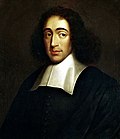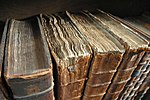Va'eira
God told Moses to go to Pharaoh at his morning bath, demand that he let the Israelites go to worship in the wilderness, and have Aaron strike the Nile with his rod and turn it into blood.
[50] In the continuation of the reading, God told Moses to take handfuls of soot from the kiln and throw it toward the sky so that it would become fine dust, causing boils on man and beast throughout Egypt, and he did so.
[62] In the maftir (מפטיר) reading that concludes the parashah,[63] Moses spread forth his hands to God, and the thunders and hail ceased, but when Pharaoh saw, he hardened his heart and did not let the Israelites go.
The Midrash viewed the question of Moses in Exodus 5:22 as an application of Ecclesiastes 2:12: "And I turned myself to behold wisdom, and madness and folly; for what can the man do who comes after the King?
[76] Rabbi Simai found evidence for the resurrection of the dead in the words, "And I also have established my covenant with them (the Patriarchs) to give them the land of Canaan," in Exodus 6:4.
[83] A Midrash interpreted the words of Exodus 6:9, "they hearkened not to Moses for shortness of spirit," to indicated that it was difficult for the Israelites to abandon idol worship.
(2) In Exodus 6:12, Moses told God, "Behold, the children of Israel have not hearkened to me," and reasoned that surely even more, "How then shall Pharaoh hear me?"
"[86] Reading Exodus 6:13, 7:8, and 9:8, a Midrash taught that in 18 verses, Scripture places Moses and Aaron (the instruments of Israel's deliverance) on an equal footing (reporting that God spoke to both of them alike),[87] and thus there are 18 benedictions in the Amidah.
The Gemara then provided an alternative explanation: Exodus 6:25 could mean that Phinehas descended from Joseph, who conquered (pitpeit) his passions (resisting Potiphar's wife, as reported in Genesis 39).
[101] A Midrash interpreted the words of Proverbs 29:23, "A man's pride shall bring him low; but he that is of a lowly spirit shall attain to honor," to apply to Pharaoh and Moses, respectively.
The Midrash taught that the words, "A man's pride shall bring him low," apply to Pharaoh, who in Exodus 5:2 haughtily asked, "Who is the Lord that I should hearken to His voice?"
And the Midrash taught that the words, "but he that is of a lowly spirit shall attain to honor," apply to Moses, who in Exodus 8:5 (8:9 in the KJV), humbly asked Pharaoh, "Have this glory over me; at what time shall I entreat for you .
"[115] Rabbi Eleazar deduced from the magicians' recognition of "the finger of God" in Exodus 8:15 (8:19 in the KJV) that a demonic spirit cannot produce a creature less than a barleycorn in size.
half a shekel for an offering to the Lord.” With the thumb and all the hand, God will in the future smite God's enemies (who Rabbi Ishmael identified as the children of Esau and Ishmael), as Micah 5:9 says, “Let your hand be lifted up above your adversaries, and let all your enemies be cut off.”[118] A Midrash interpreted the words of Exodus 8:22 (8:26 in the KJV), "Lo, if we sacrifice the abomination of the Egyptians before their eyes, will they not stone us?"
[121] The heart speaks,[122] sees,[122] hears,[123] walks,[124] falls,[125] stands,[126] rejoices,[127] cries,[128] is comforted,[129] is troubled,[130] grows faint,[131] grieves,[132] fears,[133] can be broken,[134] becomes proud,[135] rebels,[136] invents,[137] cavils,[138] overflows,[139] devises,[140] desires,[141] goes astray,[142] lusts,[143] is refreshed,[144] can be stolen,[145] is humbled,[146] is enticed,[147] errs,[148] trembles,[149] is awakened,[150] loves,[151] hates,[152] envies,[153] is searched,[154] is rent,[155] meditates,[156] is like a fire,[157] is like a stone,[158] turns in repentance,[159] becomes hot,[160] dies,[161] melts,[162] takes in words,[163] is susceptible to fear,[164] gives thanks,[165] covets,[166] becomes hard,[167] makes merry,[168] acts deceitfully,[169] speaks from out of itself,[170] loves bribes,[171] writes words,[172] plans,[173] receives commandments,[174] acts with pride,[175] makes arrangements,[176] and aggrandizes itself.
[182] Interpreting Exodus 9:34, "And when Pharaoh saw that the rain and the hail and the thunders had ceased, he sinned yet more," a Midrash taught that so it always is with the wicked: As long as they are in trouble, they humble themselves.
[185] Abraham ibn Ezra read God's statement "And I appeared" in Exodus 6:3 to indicate that the Patriarchs received their prophesies in night visions.
"[187] Ibn Ezra quotes Jeshua ben Judah as saying that Abraham and Jacob literally did not know the Name יְהוָה (YHVH), but Moses filled it in when writing down the Torah.
Ibn Ezra responded that God grants people wisdom and instills the intelligence in their hearts to either accept divine power for good or to lessen the evil that is destined to come upon them.
[193] Rashi read the words of Pharaoh's magicians in Exodus 8:15, “This is the finger of God,” to indicate that they perceived that this plague was not the result of sorcery but the Omnipresent.
[198] The parashah is discussed in these modern sources: Neḥama Leibowitz identified the following chiastic structure in God's speech to Moses in Exodus 6:2–8:[199] 2And God spoke to Moses, and said to him: Robert Alter wrote that the designation אֵל שַׁדָּי, El Shaddai, in Exodus 6:3, also used five times in the Patriarchal Tales, is an archaic, evidently Canaanite combination of divine names.
[204] Alter noted that the idea in Exodus 6:7, “that I am the Lord your God Who takes you out from under the burdens of Egypt,” is emphasized repeatedly in the Torah and later books of the Bible.
Yet Alter also found it hard to imagine that the Israelites would have invented a story of national origins involving the humiliation of slavery without some kernel of historical memory.
[208] Everett Fox noted that “glory” (כְּבוֹד, kevod) and “stubbornness” (כָּבֵד לֵב, kaved lev) are leading words throughout the book of Exodus that give it a sense of unity.
[210] Plaut reported that scholars generally agree that the term “Hebrew” (עִברִי, Ivri), as in Exodus 7:16 and 9:1 and 13, came from the name of a group called Habiru or Apiru, people who had lost their status in the community from which they came, and who were not necessarily related except by common fate.
[213] Plaut argued that it was a mistake to consider the stories literally rather than as “essentially interpretive and legendary”—asserting that the release of the Israelites from slavery was unprecedented and could only be explained by crediting God.
[223] Moritz Markus Kalisch reported an interpretation that Exodus 9:20 indicated a test by Moses of how far the fear of God had spread among the Egyptians.
[225] Reading Exodus 9:20, "Whoever feared the Lord’s word," Alter wrote that whereas elsewhere, this idiom indicates piety (as in "God-fearing"), here it has been stripped down to its literal meaning of whoever was struck with terror by God's grim threat.
Friedman saw the opening verse of Exodus 6:1 to have been composed by the Elohist (sometimes abbreviated E) who wrote in the north, in the land of the Tribe of Ephraim, possibly as early as the second half of the 9th century BCE.
[233] Reading the Passover Haggadah, in the magid section of the Seder, many Jews remove drops of wine from their cups for each of the ten plagues in Exodus 7:14–12:29.






















































